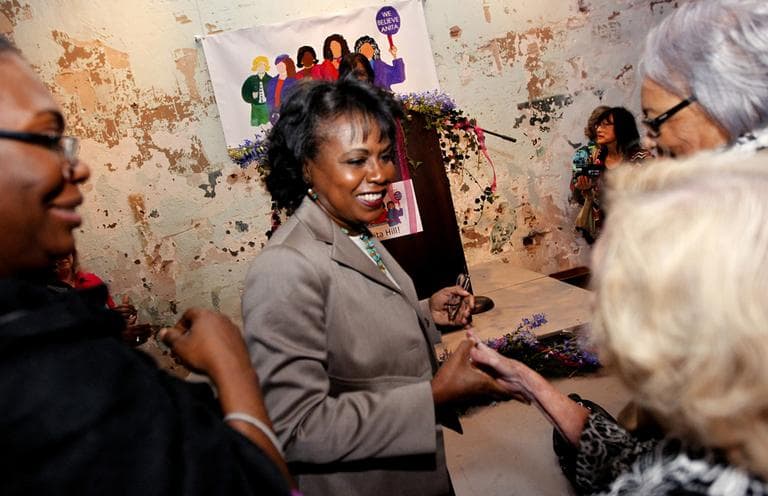Advertisement
Anita Hill 'Reimagines Equality'
Resume
Controversy. Courage. Even conspiracy. Her name is now synonymous with many things but in 1991, when Anita Hill appeared before the Senate Judiciary Committee and accused then-Judge Clarence Thomas of sexual harassment, she was simply a 35-year-old law professor at the University of Oklahoma.
Hill's testimony broke the silence around workplace sexual harassment. It forever changed the tenor of Supreme Court confirmation hearings and it turned Hill into a complex political icon — the black woman facing a barrage of questions from a panel of white men and forcing the nation to rethink its conception of equality.
Anita Hill is now a professor at Brandeis University and she joined Radio Boston on Tuesday to discuss her book "Reimagining Equality: Stories of Gender, Race and Finding Home," a personal and legal analysis of the American dream, beginning with the story of Hill's own family and ending with the social cost of the subprime mortgage crisis.
Guest:
- Anita Hill, author, professor of social policy, law, and women's studies at Brandeis University
More:
[titlebar title="Excerpt: Reimagining Equality: Stories of Gender, Race and Finding Home
" id="middleofpage"]
Introduction
Home: The place of one's dwelling or nurturing, with the conditions, circumstances, and feelings which naturally attach to it and are associated with it... not merely "place" but also "state."
- The Oxford English Dictionary
This is a book about home.
As the first decade of the new millennium came to a close, the country was still reeling from a housing crisis that caused both physical and psychological distress. The centrality of home to individuals of all stripes was never more apparent. Millions of Americans, male and female, of all races, had been set adrift as a result of reckless personal and institutional financial behavior, the precipitous decline of manufacturing industries, and in the case of Hurricane Katrina, an unprecedented natural disaster. And whether as a place or as a state of being, the significance of home to neighborhood, city, and national well-being was becoming clear. Moreover, the crisis raised questions about whether our country is indeed a welcoming location of endless possibility to those seeking the American Dream. Our national identity was being challenged by the home ownership crisis.
Many have lost faith in homeownership, a bedrock of the American Dream. This loss is further complicated by the role of the home in defining equality and democracy — a role that is often overlooked, even though where one lives determines school assignments, voting opportunities, and often the availability of jobs, goods, and services. Yet little attention is paid to the complicated interrelationship between where one calls home, what happens inside the home, and equality outside the home.
I plan to examine home as a place and a state of being by interweaving discussions of law, literature, and culture with stories of individuals, focusing on women, and African Americans, in search of equality. These stories reflect each woman's experience in finding and shaping a home where she could achieve some measure of equality for herself and her family.
Beginning with my own story, I invite readers to think about their experiences and yearning for home, even as they read of others whose experiences are different but who share a desire to be equal participants in our democracy. The women featured and I have learned over the course of our lives that home, as well as equality, need to be reconceived as our worlds change.
These stories of gender, race, and finding home guide us through a history of imagining and reimagining equality. They also address issues that have long been neglected in this country but must be grappled with in order to ensure that every American has the opportunity to achieve the sense of belonging that comes from being at home. As black women have come to head the majority of black households, they have become the primary "homebuilders." They have also become dominant forces as community builders in African American neighborhoods. Their determination to build their lives, their families, and their communities, despite harsh perceptions of them, is evidence of their belief in the promise of America, even in times when that promise may seem irreparably broken. Their struggle points to an important lesson: we may have reached the limits of current rights legislation's ability to assure liberty and equality for all. For these women and others who have yet to be perfectly at home in our nation, we need to find other strategies.
Black women know what it means physically, socially, and economically to possess a gender and a race. They know that race and gender equality must both be realized if either is to be achieved. Like other women, they struggle to balance work and family obligations, and they suffer from violence in their homes and on the streets of their communities. Along with African American men in many racially isolated neighborhoods, they endure crime, inadequate schools, and a lack of public and private amenities. With all women and black men, they face limited employment and educational opportunities, as well as underrepresentation in political arenas. We have passed many laws to try to address these inequities, to level the playing field, and yet we have not finished the work. They struggle, as millions do, to find home in America.
From Reimagining Equality by Anita Hill. Copyright 2011 by Anita Hill. Reprinted by Permission of Beacon Press, Boston.
This program aired on January 3, 2012.